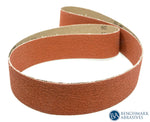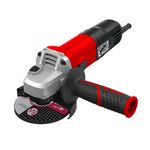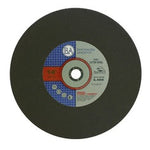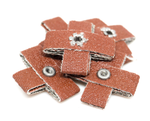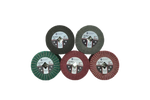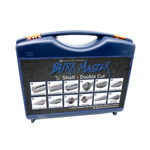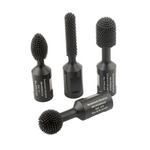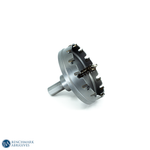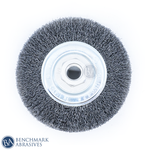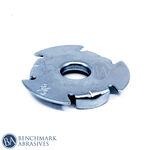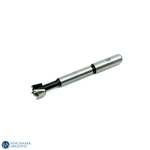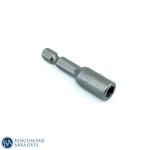
How to Choose a Hacksaw Blade
A hacksaw is an essential tool for plumbers, carpenters, and others. A hacksaw is a cutting tool built for cutting wood, plastic, steel, and other metals. As the length of the hacksaw frame can be changed to hold blades of various sizes, it is also called an adjustable hacksaw. Hacksaw blades are available in up to 12-inch sizes for cutting materials with a range of teeth.
Hacksaw Blade TPI Guide
The number of teeth (cutting edges) per inch in the hacksaw blade for metal is described by TPI. Blades usually have 14, 18, 24, and 32 teeth for every 25 mm (inch).A blade with 14 TPI is light, a medium-class 24 TPI and a blade with 32 TPI is very strong for cutting. The hacksaw blade is ideal for cutting a long plastic pipe into small tubes with shorter and narrow teeth than a traditional saw.
Here is a detailed chart of every possible size of a hack saw blade for cutting different materials.
|
Teeth Per Inch (TPI) |
Suitable For Cutting |
|
14 Tpi |
Large Sizes, Aluminum & Soft Metals |
|
18 Tpi |
Perfect For General Workshop Cutting |
|
24 Tpi |
For Cutting Steel Plates up to ⅚ mm |
|
32 Tpi |
For Cutting Hollow Sections & Tubing |
How to Choose a Hacksaw?
Every hacksaw works in the same manner; the major difference comes in variations of the blades used for hacksaw tools. A hacksaw is designed for the perfect cutting of wood, pipe, and metal.
The three most common types of hacksaw blades for steel are effective for cutting various types of metal, and it is important to know which type of blade is perfect for your job.
Read on to learn more about different types of hacksaw blades like regular, raker, and wavy blades.
Types of Hacksaw Blades
There are two most common types of hacksaw blades available for cutting, Carbon regular blades and high-speed steel blades. Carbon Steel blades are also known as hacksaw blades for wood, ideal for cutting wood. In contrast, high-speed steel blades are perfect for cutting hard materials such as steel and alloys. Regular blades do not last as long as high-speed steel blades.
The three most common types of hacksaw blades are effective for cutting different types of metals, such as regular blades, raker blades, and wavy blades.
Top 3 Hacksaw Blades For Metal Cutting
1. Regular Blade
The regular hacksaw blade is the most commonly used blade for cutting soft metals. You do not need to buy this blade separately, as hardware stores offer a regular blade with a hacksaw tool. It is perfect for cutting aluminum and tintype soft metals. The teeth alternate between the left and the right with a regular hacksaw blade and strike each other; this makes metal cutting smooth and easy.
2. Raker Blade
Raker hacksaw blades are simple and easy to identify as it has three teeth in the group. If you ignore its odd appearance, these racker blades are perfect for cutting thick metals like an iron pipe. Using a regular hacksaw blade for iron pipe cutting would not only lead to a blunt blade but also cause lots of irritation.
However, with a raker blade, you have to work hard and need to put lots of effort into cutting the pipe. But this is the right blade for your heavy-duty jobs.
3. Wavy Blade
A wavy blade is the perfect hacksaw blade for cutting thin metal. If you look carefully, the teeth of this blade run from right to left and left to right in a wave pattern. It gives your thin metal a smooth cut, although it is not suitable for thick and heavy metals.
Hacksaw Blade Length
The length of a hacksaw blade plays a crucial role in selecting the hacksaw for cutting jobs. It has a direct impact on your cutting abilities and how well you can control. Some of the popular blade lengths are listed below:
-
8 inches: the 8 inches or 200mm blade length is perfect for working on smaller surfaces and complex areas. It offers better control due to its compact size. It also gives accurate results and is suitable for intricate projects. Additionally, they can do wonders on delicate surfaces or materials.
-
10 inches: The 10-inch or 250mm blade length is used in a wide range of applications. They are perfect for general cutting tasks. They are perfectly suitable for cutting smaller and larger materials offering a balance between cutting range and accuracy.
-
12 inches: The 12-inch or 300mm blade length is suitable for cutting large or thicker workpieces. These blades have more strength and power compared to other blades. As these blades cut aggressively, they offer less control.
What is the Best Hacksaw Blade?
Benchmark Abrasives 12” Bi-metal hacksaw blade is considered the best hacksaw blade. It is a perfect tool for plumbers and carpenters to cut through steel, wood, and plastic pipes. A time-tested and handy hack saw blades specifically built to cut metal. The blades are solid and reliable to use with a standard hacksaw.

